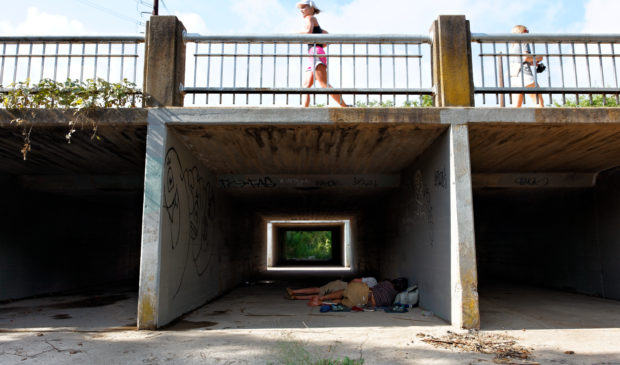Debates continue over impacts, enforcement of new homelessness ordinances
Tuesday, August 13, 2019 by
Chad Swiatecki Recent changes to ordinances covering camping and soliciting by homeless people continue to be a hot topic of debate at city meetings, with residents and special interest groups pushing for a reversal to the June vote, or significant changes in how Austin police enforce the rules.
Last week’s City Council meeting featured an item not directly tied to the ordinances, giving the OK to create a public-private fundraising body that would help provide money for housing the homeless. Nearing 1 a.m., that item was passed unanimously by Council, though it was preceded by 30 minutes of public comment about the impact of allowing homeless people to sit or lie down in public spaces.
Among the speakers was Travis County GOP chair Matt Mackowiak, whose Change.org petition urging Council to reinstate the camping and panhandling bans had gained nearly 25,000 signatures as of Monday afternoon. Mackowiak, who had no opinion on the agenda item itself, said the accumulation of litter and human waste around homeless campsites is creating a highly visible public health and safety problem for residents.
“I understand you wanted to decriminalize homeless existence. I certainly don’t think putting homeless people in jail who are not committing violent crimes is a way to get them back on their feet,” he said. “From a public safety standpoint, pulling police off of their beats off of violent crime so they’re having to respond to 311 calls to determine whether a person is lying in a correct position on a sidewalk to not be obstructing does not improve public safety.”
Council members gave no response to Mackowiak’s recommendation to change the homelessness policies at their Aug. 22 meeting. Council Member Greg Casar did, however, respond to his comments. Casar said the litter and waste problems Mackowiak and others have brought up in recent weeks were present prior to the vote to decriminalize homelessness but were just more hidden.
“I still don’t understand how it is that ticketing or arresting someone for merely being outside reduces homelessness or reduces human waste from folks that don’t have a bathroom to go to, or how that reduces violence,” Casar said. “I haven’t seen how recriminalizing those behaviors is going to reduce those behaviors that you’ve brought up.”
The Austin Police Department is still determining how to respond to and enforce complaints where obstruction of sidewalks and other public places presents possible safety hazards.
At Friday’s meeting of the Mayor’s Committee for People With Disabilities, Assistant Chief Justin Newsom said the police department will likely have to respond immediately to 911 calls from people using wheelchairs or walkers who encounter sidewalk obstructions caused by homeless campsites.
“If you’re in the situation, especially if you’re mobility-impaired and trying to get through with a walker or cane or a wheelchair and you encounter a situation that you can’t make it through, then that is a time where we can get that person to move because they’re rendering (the path) impassable,” he said. “If you called 911 for that we would respond to make that person move away. As we’ve been having these conversations around these ordinances as they’ve changed, the topic of how they affect those who are disabled has kind of been left out, at least in any conversations I’ve been in. Not intentionally, but I don’t think anyone has thought about that as we’ve had these discussions.”
Newsom said the department hasn’t seen an increase in 911 calls for violent incidents or other public safety problems tied to the relaxed homelessness ordinances. He said July was the first month in memory that the department didn’t write a single ticket for sitting or camping, compared to 25-50 tickets per month before the ordinance change.
He also said that data collected by downtown security officers hired by the Downtown Austin Alliance showed that annually there had been around 8,000 requests from police asking homeless individuals to move their belongings out of the public right of way. With the new policies, those requests are no longer being made, which is in part resulting in those individuals accumulating more belongings in their campsite.
While Newsom said sidewalk access issues for disabled people would need to be “complaint driven” since it is hard to judge what areas are passable, Committee Member Deborah Trejo said APD will need to find a way to ensure sidewalks have the minimum Americans with Disabilities Act width of 32 inches clearance around campsites at all times.
“I don’t think it should require complaint-driven situations, for people in wheelchairs to say ‘I was personally blocked.’ Y’all should always be literally measuring and it should be the door width that’s required for ADA wheelchair passage,” she said. “The fact that you would make people complain … your sidewalks should be accessible and if we say we can let a skinny person go by and that’s enough, that really isn’t ensuring that the sidewalks are ADA-compliant.”
Newsom said he plans to talk to the city’s legal department this week to determine APD’s role in enforcing the accessibility considerations related to the code.
Photo by Lars Plougmann made available through a Creative Commons license.
The Austin Monitor’s work is made possible by donations from the community. Though our reporting covers donors from time to time, we are careful to keep business and editorial efforts separate while maintaining transparency. A complete list of donors is available here, and our code of ethics is explained here.
You're a community leader
And we’re honored you look to us for serious, in-depth news. You know a strong community needs local and dedicated watchdog reporting. We’re here for you and that won’t change. Now will you take the powerful next step and support our nonprofit news organization?










